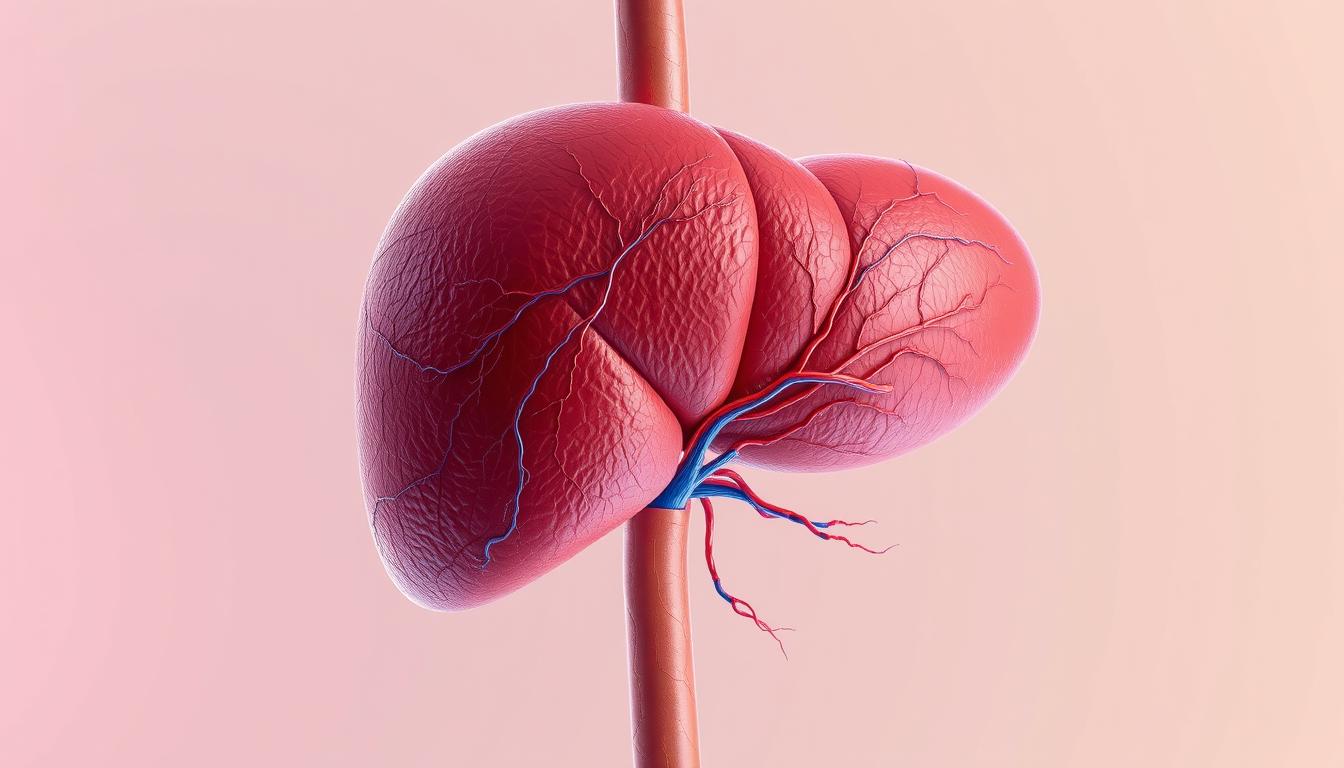Your liver is a big deal, weighing in at 3 pounds. It’s a powerhouse, doing over 500 important jobs in your body. It’s in your upper right abdomen and does things like filter blood, remove toxins, make bile, and process nutrients.
This organ is a hero, keeping your blood’s chemical levels in check, making important proteins, and breaking down medicines. Keeping your liver healthy is key to feeling good. Learning about how it works can help you take care of it better.
Key Takeaways
- The liver is a vital organ that weighs approximately 3 pounds and performs over 500 essential functions in the body.
- The liver is responsible for blood filtration, toxin removal, bile production, nutrient processing, and regulation of chemical levels in the blood.
- Maintaining optimal liver health is vital for your overall well-being, as the liver plays a critical role in numerous bodily processes.
- Understanding the liver’s structure and functions can empower you to take proactive steps to support your hepatic health.
- Familiarizing yourself with common liver problems and risk factors can help you recognize signs of possible liver issues and seek timely medical attention.
Understanding the Liver’s Location and Structure
The liver is a vital organ located beneath the diaphragm. It sits atop the stomach, right kidney, and intestines. This dark reddish-brown, cone-shaped organ is about the size of a football and weighs around 3 pounds. It’s the largest solid organ in the body. Knowing about the liver’s unique structure is key to staying healthy.
Anatomical Position and Size
The liver is roughly triangular in shape. It has two main lobes: a larger right lobe and a smaller left lobe. These lobes are separated by the falciform ligament. This robust organ is in the upper right part of the abdomen, just beneath the diaphragm.
Blood Supply and Composition
The liver gets blood from two sources: the hepatic artery and the hepatic portal vein. The hepatic artery brings oxygenated blood. The hepatic portal vein brings nutrient-rich blood. This dual blood supply is key for the liver’s many functions.
Liver Lobes and Segments
- The liver has four anatomical lobes: the right lobe, left lobe, quadrate lobe, and caudate lobe.
- Each lobe is divided into eight functional segments. Each segment has thousands of lobules connected to bile ducts.
- This detailed structure lets the liver perform over 500 distinct roles. It’s vital for our health and well-being.
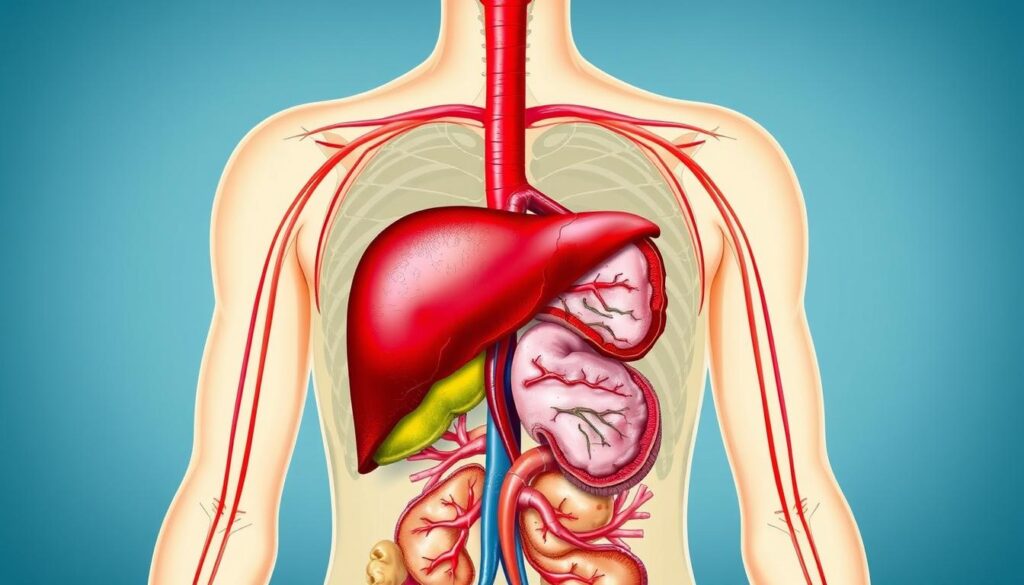
“The liver is the largest gland in the human body, weighing approximately 1.5 kilograms.”
Essential Liver Function in Your Body
Your liver is an amazing organ, doing over 500 important jobs in your body. It filters more than a liter of blood every minute. This is about 13% of your body’s total blood.
It filters an incredible 22 gallons of blood per hour. That’s 250 gallons in just 24 hours.
The liver is key in making proteins, making cholesterol, controlling sugar levels, and storing iron. It also cleans the blood of drugs and toxins. Your liver helps with blood clotting, immune function, and bilirubin removal. It also breaks down proteins, carbs, and fats, and stores vitamins for your body.
- Regulates bilirubin levels in the blood
- Produces important proteins, including those involved in blood clotting
- Stores vitamins and minerals, such as iron, for future use
- Breaks down and metabolizes fats, carbohydrates, and proteins
- Filters and removes toxins, drugs, and other harmful substances from the bloodstream
The liver can fix and replace damaged cells. This makes it a true wonder of the human body. Knowing how the liver works helps us see why it’s so important for our health.
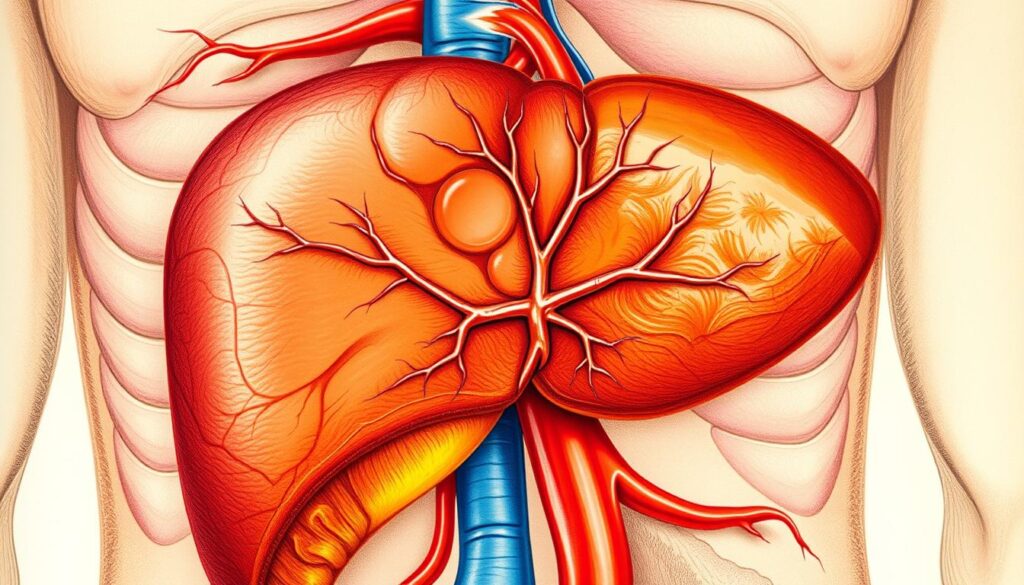
The Liver’s Role in Blood Filtration and Detoxification
The liver is a remarkable organ, playing a vital role in blood filtration and detoxification. It filters all the blood from the stomach and intestines. It processes and breaks down nutrients, drugs, and toxins.
Toxin Removal Process
The liver converts poisonous ammonia into urea. This urea is then excreted through the kidneys as urine. It also breaks down old or damaged blood cells. It recycles essential nutrients like iron and vitamins.
Bile Production and Waste Elimination
The liver produces bile, a fluid that helps carry away waste products. It breaks down fats in the small intestine during digestion. The bile by-products enter the intestine and are eliminated as feces. The blood by-products are filtered out by the kidneys and expelled through urine.
Maintaining a healthy liver is essential for overall well-being. It performs over 500 tasks to keep the body functioning optimally. Regular check-ups, a balanced diet, and avoiding harmful substances can help keep your liver healthy. This ensures your liver remains in top shape, effectively filtering your blood and eliminating toxins from your body.
| Liver Detoxification Processes | Key Facts |
|---|---|
| Toxin Removal |
|
| Bile Production and Waste Elimination |
|
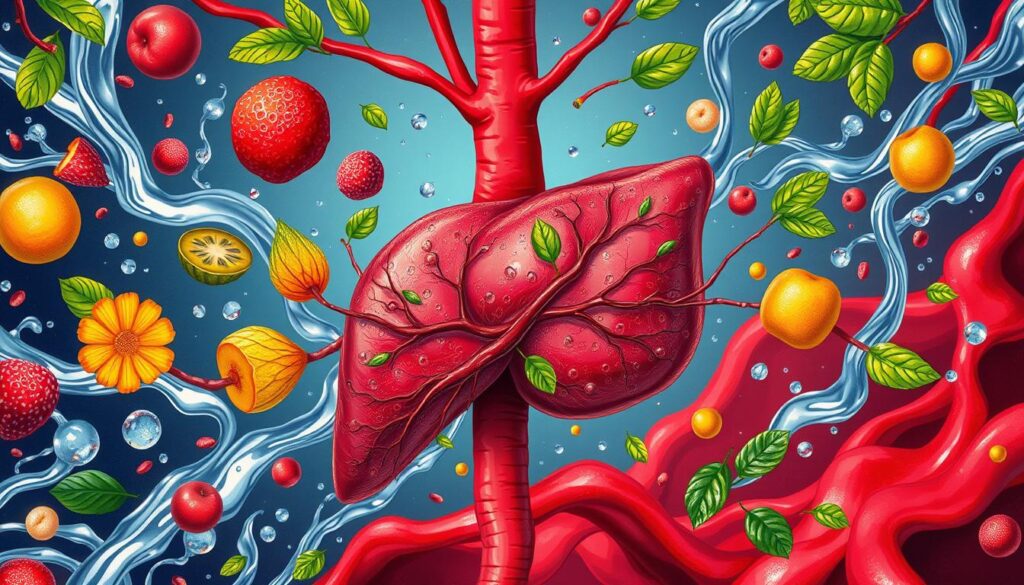
“The liver performs approximately 500 tasks to maintain a healthy body, showing its importance in metabolic processes.”
Key Liver Enzymes and Proteins
Your liver is a remarkable organ, responsible for many essential functions in your body. It produces important enzymes and proteins that show how well your liver is working. Let’s look at the main liver enzymes and proteins tested in liver function tests.
The main liver enzymes checked include Alanine transaminase (ALT), Aspartate transaminase (AST), Alkaline phosphatase (ALP), and Gamma-glutamyltransferase (GGT). These enzymes give clues about your liver’s health. For example, high levels of ALT, AST, ALP, or GGT might mean liver damage or disease.
Albumin is another key liver protein. It helps keep fluids balanced, carries substances, and supports liver function. Low albumin or total protein levels can also point to liver issues.
Knowing the normal ranges of these liver enzymes and proteins is key. The standard ranges are:
- ALT: 7 to 55 units per liter (U/L)
- AST: 8 to 48 U/L
- ALP: 40 to 129 U/L
- Albumin: 3.5 to 5.0 grams per deciliter (g/dL)
- Total Protein: 6.3 to 7.9 g/dL
- Bilirubin: 0.1 to 1.2 milligrams per deciliter (mg/dL)
- GGT: 8 to 61 U/L
By watching these liver enzymes and proteins, doctors can understand your liver’s function. They can spot any problems early. This helps manage liver-related conditions effectively.
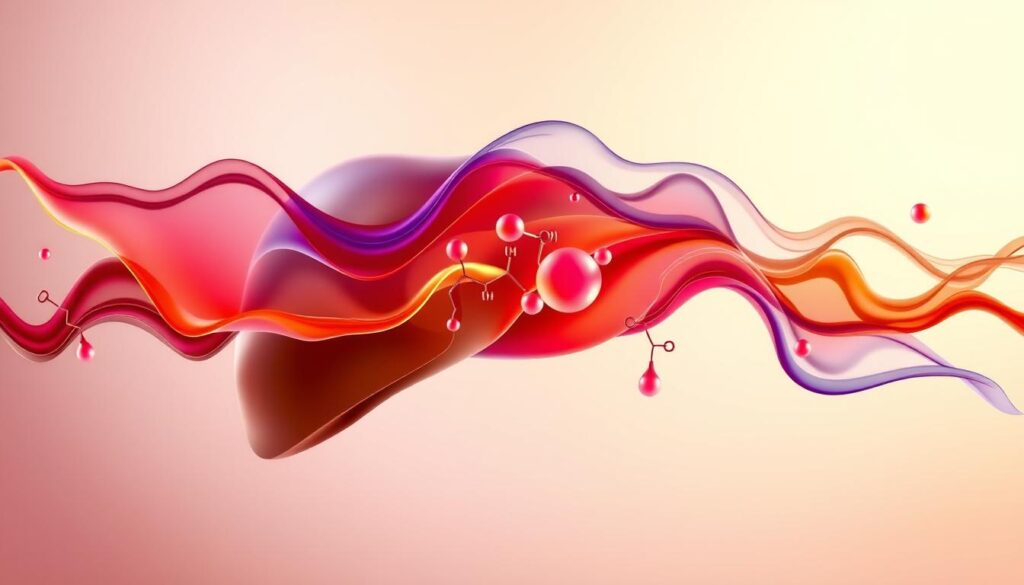
Common Signs of Liver Problems
The liver is a vital organ that does many important jobs in our body. But, when it’s not healthy, we might notice some symptoms. Knowing these signs can help us find liver problems early and get help fast.
Physical Symptoms
J jaundice is a clear sign of liver trouble. It makes the skin and eyes turn yellow because of too much bilirubin. Other signs include belly pain, feeling very tired, nausea, and losing weight without trying.
Warning Signs to Watch For
- Dark-colored urine
- Pale, clay-colored stools
- Itchy skin
- Easy bruising or bleeding
- Swelling in the legs or abdomen
When to Seek Medical Help
If you keep getting symptoms like jaundice or bad belly pain, get help right away. Liver issues can come from many things, like viral infections, alcohol, and autoimmune diseases. Catching it early is key to avoid serious problems like cirrhosis or liver failure.
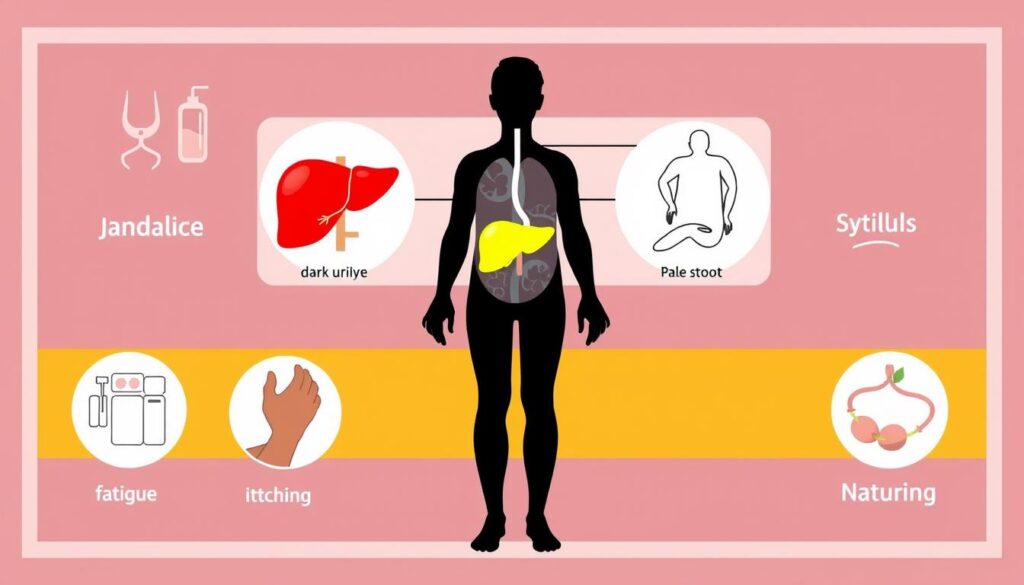
Knowing the signs of liver problems can help keep you healthy. Your liver is very important for your health. Take care of it to stay well.
Understanding Liver Function Tests
Keeping your liver healthy is key to your overall health. Liver function tests are important for checking your liver’s health. They measure enzymes and proteins in your blood to see how well your liver is working.
Bilirubin levels are a big part of these tests. Bilirubin is a waste product your liver breaks down. High levels can mean your liver is damaged or not working right. This could be due to hepatitis, cirrhosis, or blocked bile ducts.
| Test | Normal Range |
|---|---|
| Alanine Aminotransferase (ALT) | 7-55 U/L |
| Aspartate Aminotransferase (AST) | 8-48 U/L |
| Alkaline Phosphatase (ALP) | 40-129 U/L |
| Total Bilirubin | 0.1-1.2 mg/dL |
If your liver function tests show something off, you might need more tests to find out why. This could be because of liver disease, side effects from medicine, or another health issue. Knowing about these tests helps you take care of your liver and catch any problems early.
“Liver function tests are a valuable tool in diagnosing and monitoring liver diseases, as well as assessing the overall health of this vital organ.”
Getting regular check-ups and keeping an eye on your liver function tests is important. It helps make sure your liver keeps doing its job, keeping you healthy.
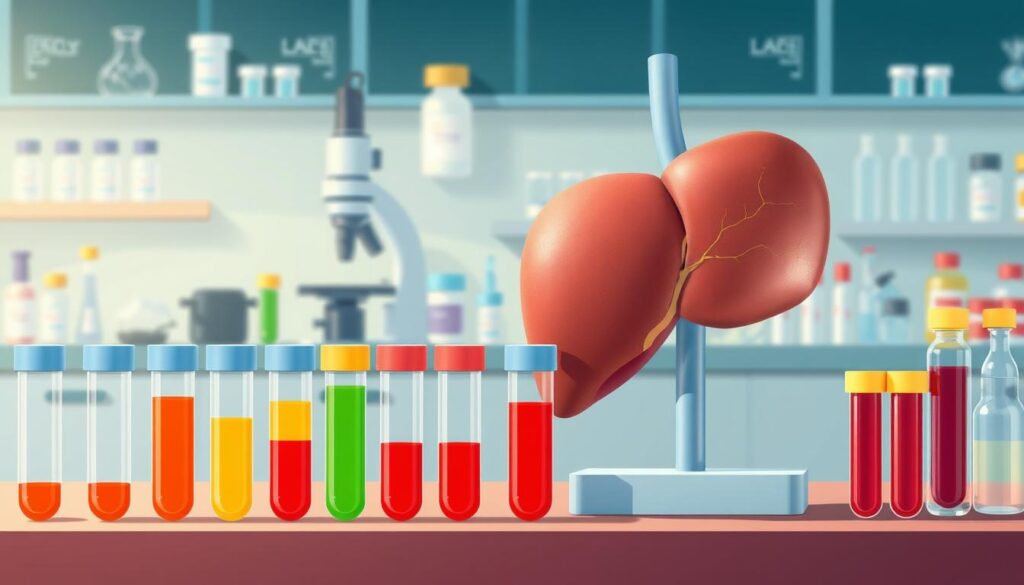
Major Threats to Liver Health
Your liver does over 500 important jobs in your body. It filters blood and helps with metabolism. But, many dangers can harm it and cause serious problems. Knowing what risks exist is key to keeping your liver healthy.
Disease Risk Factors
Viral infections like hepatitis A, B, and C can harm your liver. Drinking too much alcohol can lead to fatty liver disease and cirrhosis. Also, genetic conditions like hemochromatosis and Wilson’s disease can affect liver health. Liver cancer, which is growing fast, is another big worry.
Lifestyle Impact on Liver Health
What you do every day can affect your liver. Eating too much fat and sugar can cause fatty liver disease, affecting up to 30% of adults in the U.S. Not moving enough and being overweight or obese also raise liver risks. Exposure to harmful substances, like some medicines or drugs, can stress your liver too.
| Risk Factor | Impact on Liver Health |
|---|---|
| Viral Hepatitis | Chronic liver disease, cirrhosis, liver cancer |
| Excessive Alcohol Consumption | Alcoholic fatty liver disease, cirrhosis |
| Obesity and Poor Diet | [Fatty liver disease], increased inflammation |
| Exposure to Toxins | Liver damage, liver failure |
| Inherited Liver Disorders | Impaired liver function, increased risk of liver disease |
By knowing the main threats to liver health and acting early, you can safeguard this vital organ. This helps keep you healthy overall.
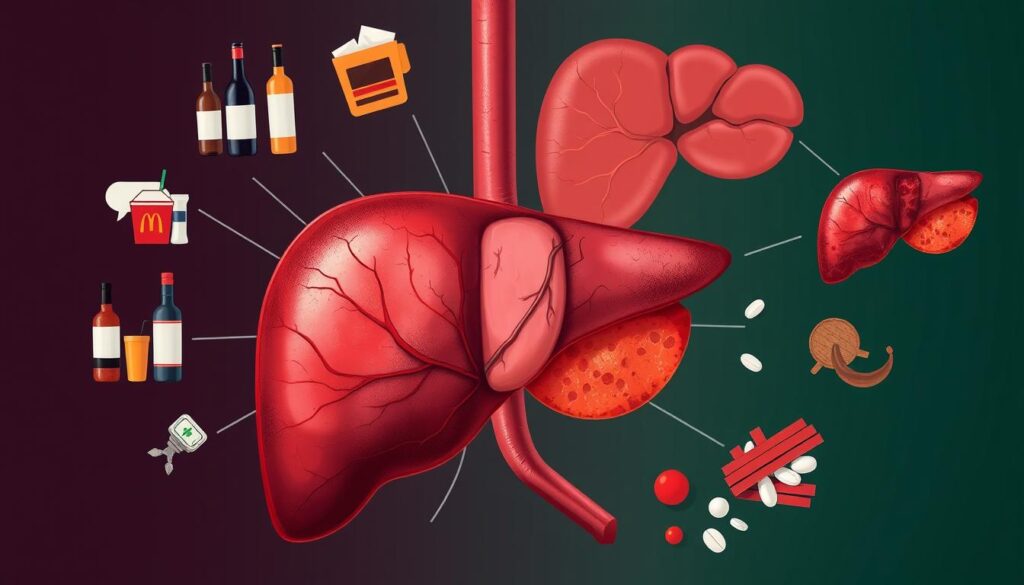
Maintaining Optimal Liver Health
Your liver does over 500 important jobs in your body. To keep it working well, it’s key to live a healthy lifestyle. Here are some liver health tips to help:
- Drink no more than 1 alcoholic drink a day for women and 2 for men. Too much alcohol can harm liver cells.
- Stay at a healthy weight by exercising and eating well. Being overweight can lead to liver disease.
- Stay away from harmful substances like chemicals in cleaning products. They can harm your hepatic wellness.
- Always follow your doctor’s advice on medications and supplements. Some can be hard on the liver.
Regular health checks can spot liver problems early. This lets you act fast. By following these steps, you can keep your liver healthy and working right.
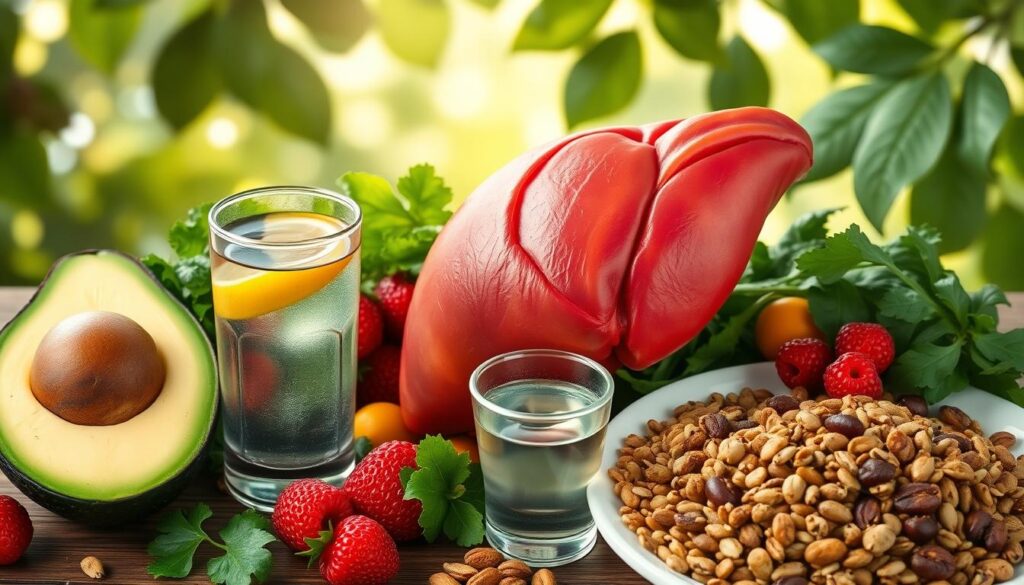
“The liver is one of the most versatile and resilient organs in the body, capable of regenerating up to 90% of its original size. By taking care of it, you’re investing in your overall well-being.”
Conclusion
The liver is a complex and vital organ, doing hundreds of important jobs for your health. It’s key to know how important liver function is and keep your liver healthy. Regular health checks, a healthy lifestyle, and knowing liver disease signs can help catch problems early.
If you notice any odd symptoms, seeing a healthcare professional quickly is important. Taking care of your liver is a smart move for your health and future.
In the United States, about 4.5 million adults had chronic liver disease and cirrhosis in 2017. This is 1.8% of all adults. Sadly, 41,473 people died from it, showing how serious it is.
Alcohol, viral hepatitis, genetic issues, and autoimmune diseases are some causes. These factors make liver diseases more common.
By learning, making healthy choices, and getting medical help when needed, you can help your liver. Your liver can heal and recover, but it needs your support. Taking care of your liver is a smart choice for your health and happiness.
